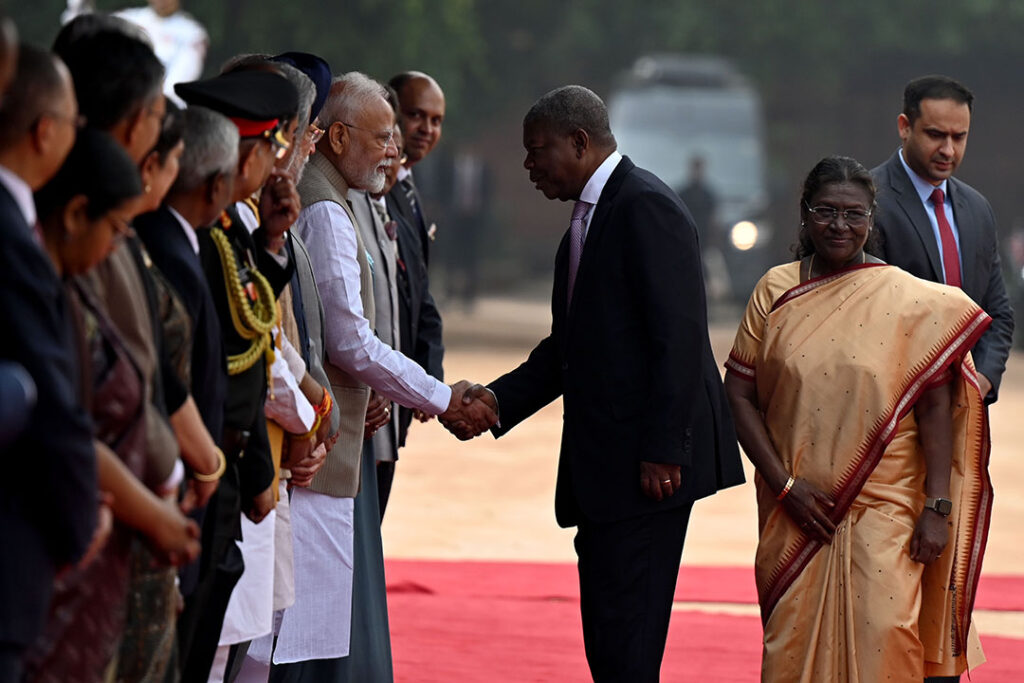When Angolan President João Lourenço visited New Delhi in early May, it marked a realignment of the country’s foreign policy priorities. After meeting with Indian Prime Minister Narendra Modi, the two countries signed memoranda of understanding in areas such as medical, agricultural and cultural cooperation.
The agreements were viewed not only as a move by Angola toward India but also away from China.
“At the heart of Luanda’s growing partnership with New Delhi lies Angola’s strategic intent to hedge against its excessive dependence on China,” wrote Samir Bhattacharya, an associate fellow at Observer Research Foundation, or ORF, a nonpartisan, independent global think tank based in Delhi, India.
India also extended a $200 million line of credit for Angolan defense procurement. Dammu Ravi, Indian secretary for economic relations, said Angola will source defense equipment from India and noted that Luanda has a large number of Soviet defense equipment that needs to serviced, overhauled and maintained, Indian online newspaper The Print reported.
“By extending a $200 million defense Line of Credit, India is signaling its intent to play a more active role as a security partner in Africa — a space long shaped by Western and Chinese influence,” Bhattacharya wrote. “This move also complements India’s wider strategic efforts to deepen its engagement in the Indian Ocean Region (IOR) and beyond, underlining Angola’s Atlantic coast as geopolitically relevant.”
During Lourenço’s visit, Angola signed onto the International Solar Alliance agreement, an India-led initiative designed to promote the adoption of solar energy among nations situated within the Tropics of Cancer and Capricorn.
Angola’s financial relationship with China was built on a simple equation: Angola would repay its growing Chinese debt with oil. Beijing has extended 258 loans worth $45 billion to Luanda — a quarter of the total Chinese loans extended to Africa. Widely known as the “Angolan model,” this blueprint was replicated across the continent.
“While Beijing promoted it as a mutually beneficial strategy, the approach has attracted significant international scrutiny and criticism, particularly for fostering neocolonial economic practices,” Bhattacharya wrote.
China has begun importing less oil from Angola and other African nations and more from Asia, the Persian Gulf and Russia. The shift has been driven, in part, by African countries’ lack of investment in new oil fields and infrastructure. Aging equipment and shrinking oil fields make the continent’s oil producers, including Angola, less reliable as exporters, according to researchers with the Carnegie Endowment for International Peace.
The shift also reflects the lopsided relationship between African countries and China. Although China remains the largest export market for Angola and other African nations, the continent amounts to less than 5% of China’s imports, according to Carnegie Endowment researchers.
In 2010, Angola was China’s second-largest oil exporter behind Saudi Arabia. By 2023, Angola had fallen to eighth place. Between 2019 and 2023, Angola’s exports to China fell 20%, according to the Carnegie report.
The promise of rapid, infrastructure-led development in Angola under the Chinese partnership also has faltered. Chinese-funded projects largely were executed by Chinese firms that employed Chinese labor. The construction quality often was substandard.
A notable example is an $8 million hospital built in Luanda in 2005. In 2010, the hospital evacuated 150 patients over concerns that the building could collapse. The hospital was built by the China Overseas Engineering Group Co. through credit lines provided by Beijing.
“A structure built so recently should not present this type of problem, which puts patients’ lives in danger,” Ariana Afonso, an Angolan parliamentarian, said at the time on state radio. “Luanda’s provincial government should find those responsible. Because $8 million is a lot for a building that took so little time to build.”
Since taking office in 2017, Lourenço has openly criticized the investment agreements with China negotiated by the previous administration. Angola in 2022 rejected a Chinese bid to manage the Lobito Atlantic Railway, according to the Global Research Institute at the College of William & Mary. China completed a rehabilitation project on the railway in 2014. Angola instead awarded a 30-year concession to the United States-backed Lobito Atlantic Railway Company, a private consortium that pledged $555 million in regional investment.
The U.S. in 2024 announced more than $560 million in new funding for the Lobito Corridor, which included at least $200 million in private sector investments for co-located infrastructure projects, according to the Global Research Institute.
Angola is now “charting a more balanced and autonomous course in its international engagements, with India emerging as a pivotal partner in that endeavor,” Bhattacharya wrote.

